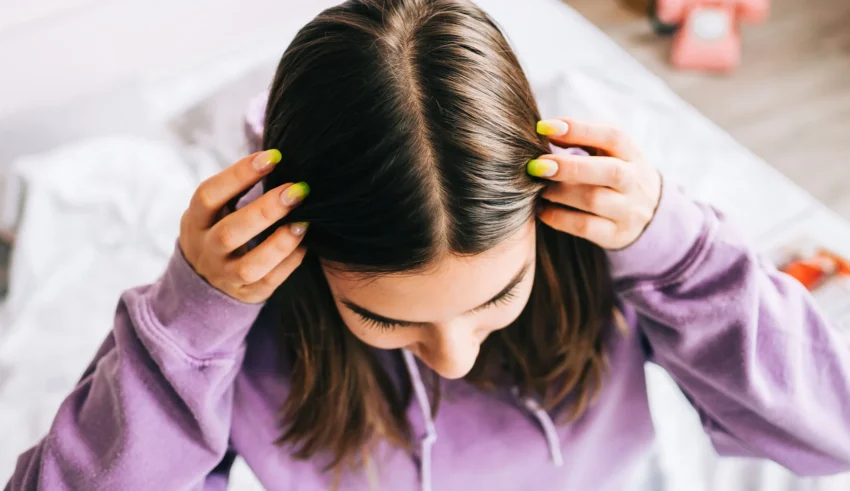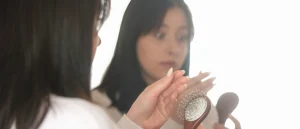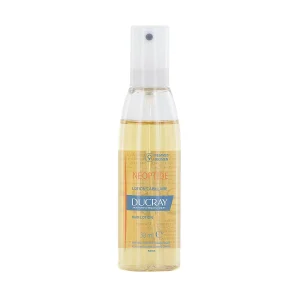
Hair loss can be devastating, but if you feel that your hair may be thinning, you should know that you are not alone. Hair loss is one of the most common problems seen by dermatologists, and treatment is possible in most cases. The first step is to determine the cause, and the key is to start early. That’s why we reached out to the dermatologist Dr. Patricia Oliveira to shed some light on hair loss causes and treatment options.
What are the most common hair loss causes?
It is normal to lose 50 to 100 hairs per day. Losing much more means you have excessive hair loss. Some causes of hair loss can lead to specific hair patterns and symptoms. Read on to learn more about the most common reasons.
1) Age
Almost everyone notices hair loss and thinning hair as they age. When we get older, our cells die faster than they regenerate.
As we age, the scalp produces less oil, which can make hair weak and brittle. This can also contribute to overall hair loss and thinning.
2) Genetics
The most common type of hair loss, androgenetic alopecia, is hereditary and age-related. It is commonly called male or female pattern alopecia and affects many people. It is a more extreme form of hair loss that usually begins in early adulthood and progresses gradually with age.
3) Hormonal changes
Pregnancy, childbirth, menopause, and hypothyroidism, can affect hair growth. Even a change in your medication routine can lead to hair thinning if your medication affects your hormone levels. For example, some women who stop taking birth control pills may experience hair loss.
4) A stressful life event
Stressful life events, such as the loss of a loved one, surgery, or the diagnosis of a serious illness, can all increase the risk of hair loss. But hair loss itself can also be stressful, which can lead to a vicious cycle.
5) Nutritional deficiencies
A type of hair loss called telogen effluvium can occur. It starts more slowly and lasts more than 6 months. Possible causes are often related to nutritional deficiencies. Which vitamin deficiency causes hair loss? According to Dr. Patricia Oliveira, deficiencies in iron, vitamin D, zinc, and selenium can lead to hair loss.
6) Autoimmune disease
Alopecia areata is a form of autoimmune hair loss. The body’s immune system attacks healthy hair follicles, resulting in hair loss.
7) Infections
Infections can affect the scalp and cause hair loss. This happens when bacteria, yeast, or fungi multiply and invade the hair follicles. You may see bumps of pus, redness, and scaling.
8) Medications
Some medications can cause hair loss as a side effect.
9) Hair trauma and inflammation
Infections and certain inflammatory skin conditions might destroy hair follicles. Traumatic styling practices, such as hot styling, chemical treatments, and tight hairstyles, can also cause scarring hair loss.
10) Chemotherapy and radiation therapy
Cancer patients undergoing chemotherapy or radiation therapy are seriously concerned about hair loss.
What are the causes of hair loss in children?
For the majority of children with hair loss, one of the following conditions is the cause.
- Tinea capitis
Tinea capitis, commonly known as ringworm, is a fungal infection often seen in children. It is characterized by scaly patches of hair loss on the head. These patches are usually round or oval. The hair may be broken at the surface of the skin and look like black dots on the scalp.
- Alopecia areata
Alopecia areata is a non-contagious hair loss that is believed to be caused by an attack on the hair follicles by the body’s immune system.
- Trichotillomania.
Trichotillomania is hair loss caused by a child pulling, plucking, twisting, or rubbing his or her hair. The hair loss is patchy and characterized by broken hair of varying lengths. Patches are usually visible on the side of the child’s dominant hand.
- Nutritional deficiency
Although less common, hair loss can be a symptom of a deficiency in certain nutrients.
- Endocrine problems
In some children, hair loss is caused by hypothyroidism, a condition in which the thyroid is underactive and produces insufficient amounts of thyroid hormone to regulate metabolism.
How is excessive hair loss treated?
The causes of excessive hair loss in females and males are numerous and frightening. A treatment plan to regrow your hair may include one or more of the following:
1- Supplement your diet
Consider some targeted and specialized supplements for hair loss. The following food supplement provides the hair bulb with essential nutrients (such as vitamins B6, B8, E, and iron). This strengthens the hair and promotes quality hair growth.
Ducray Anacaps Food Supplements
2- Supplement your hair care regimen as well
If you are experiencing abnormal hair loss, you need to adopt the right habits in response. Adapt your hair care routine by incorporating products that are targeted to treat this type of condition. All dermatologists agree that you should switch from your regular shampoo to a specific anti-hair loss shampoo. Anti-hair loss shampoos are specially formulated with energizing elements to revive the metabolism of the hair shaft bulb cells.
Research studies have shown that B vitamins (B2, PP, B5, B6, B8, or B9) play an essential physiological role in cell metabolism and cell renewal. Therefore, a vitamin B deficiency can exacerbate the phenomenon of hair loss.
Additional steps to take to optimize anti-hair loss effectiveness:
Apply your anti-hair loss shampoo by massaging it lightly with your fingertips in circular motions from the inside to the top of your head: this helps bring oxygen to the scalp and stimulate blood circulation. We recommend the following anti-hair loss shampoo:
Ducray Anaphase + Anti-Hair Loss Complement Shampoo
Complement your routine with an anti-hair loss care product, such as an anti-hair loss lotion which helps reduce hair loss and stimulates hair growth. Note that different types of anti-hair loss lotions are available and should be chosen according to the type of hair loss (occasional or chronic).
We recommend:
For occasional hair loss:
Ducray Creastim Anti-Hair Loss Lotion
For chronic hair loss:
Ducray Neoptide Anti-Hair Loss Lotion for Women
Ducray Neoptide Anti-Hair Loss Lotion for Men
3- Medications
Medications, whether topical or oral, can help with hair loss. Some require a prescription while others are over-the-counter products.
4- Laser treatment
Laser treatment, or treatment with medical devices that emit colored light, is available. In some cases, they have been shown to help control hair loss.
5- Procedures
Procedures, such as hair restoration or transplantation, involve removing hair-bearing skin, usually from the back of the head, and transplanting it into the bald areas of the scalp. These are excellent procedures that offer a permanent solution for some people.
FAQs on the causes of hair loss
Can anesthesia cause hair loss?
Dr. Patricia Oliveira says that general anesthesia can cause telogen effluvium, a condition that is usually temporary in which an abnormal amount of hair is lost.
Can hair bleaching cause permanent hair loss?
According to Dr. Patricia Oliveira, hair dye can damage your hair, but in most cases, it does not cause hair loss. Hair dye causes hair protein to be lost in small amounts, which can make the hair appear thinner, especially if you lighten your hair color. But it can also directly cause hair loss if there is a chemical accident – for example if you leave the bleach on your scalp too long.
Does magnesium deficiency cause hair loss?
Dr. Patricia Oliveira notes that a magnesium deficiency gives calcium the freedom to run amok. In other words, these small calcium deposits in and around the hair follicles can cause hair loss.
Does an ovarian cyst cause hair loss?
Dr. Patricia Oliveira states that these follicles are not harmful, but they can cause a hormonal imbalance, often resulting in several problems, such as irregular or no periods, weight gain, difficulty getting pregnant, excessive body hair, thinning hair on the head, and acne or oily skin.














